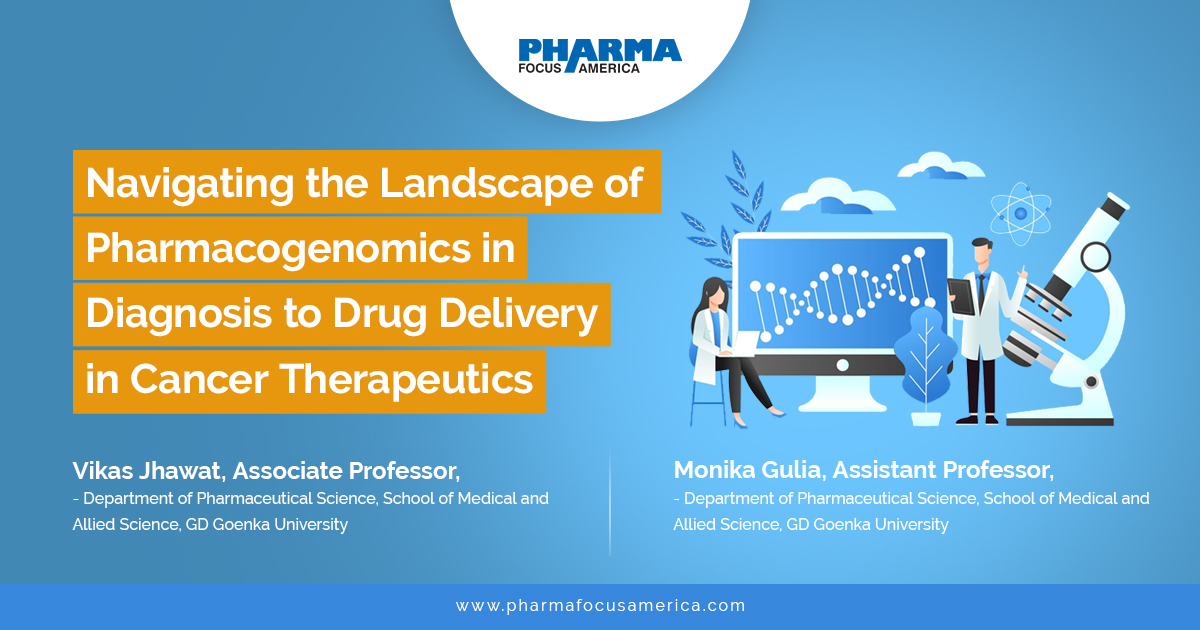
Vikas Jhawat, Associate Professor, Department of Pharmaceutical Science, School of Medical and Allied Science, GD Goenka University
Monika Gulia, Assistant Professor, Department of Pharmaceutical Science, School of Medical and Allied Science, GD Goenka University
In the realm of cancer therapeutics, pharmacogenomics has emerged as a critical linchpin in shaping treatment decisions. The relentless adaptability of cancer cells, often culminating in resistance to chemotherapy and targeted therapies, underscores the pressing need for a more targeted approach. Pharmacogenomics, through the illumination of genetic mutations underpinning drug resistance, offers a powerful compass for oncologists. This genetic insight not only permits the tailoring of individualized treatment plans but also facilitates the precise selection of drugs most likely to exert a therapeutic effect.
Furthermore, it spearheads the optimization of drug formulations, honing the delivery mechanisms to their utmost efficacy while minimizing the looming specter of adverse effects. This confluence of genomics and therapeutics not only personalizes cancer treatment but also accelerates the quest for precision medicine, identifying patients poised to reap the greatest benefits from specific treatments, determining the most suitable pharmaceutical agents, and refining drug delivery modalities to enhance treatment outcomes and patient well-being.
Pharmacogenomics is the science of the study of genetic variability and its effects on drug action. This determines the behavior of a drug inside the individual’s body. Every human being has a different genetic makeup, due to which there is a difference in the overall metabolic activity, so the action of drugs is also expected to be different in individuals, which is ultimately affecting the final outcome of the therapy. Applications of pharmacogenomics are limited to the theoretical concept till now and only focused on individualized drug therapy, although if explored to its full potential, it can change the entire therapeutic system with a higher degree of accuracy, effectiveness, and the lowest level of adverse events [1]. Pharmacogenomics may have applications beyond individualized drug therapy, such as diagnosis of disease, dosage formulation development and evaluation, targeted delivery systems, theranostic delivery systems, and polymer activities [2].
Genes code for and control different biological activities (metabolic activities) inside the body via different intermediates such as enzymes, proteins, hormones, and effector cells. These mentioned intermediates may act as the diagnostic and therapeutic biomarkers and may help in the diagnosis of disease and designing a suitable dosage form [3]. Identification of genome-based disease-specific biomarkers (both diagnostic and therapeutic) is the first step in designing the suitable therapeutic system (fig 1). In the area of cancer research, pharmacogenomics-based approaches to diagnosis and treatment could be of prodigious importance [4]. In cancer therapeutics, pharmacogenomics can be used to guide therapy decisions, reduce adverse effects, and improve clinical outcomes. Cancer is a complex disease that involves the growth and spread of abnormal cells in the body. Cancer cells behave differently than normal cells because of variations in receptors, biomolecules, and biomarkers (either overexpressed or underexpressed); hence, the basic requirements for the cancer cells to be alive are different in comparison to normal cells [5].
The treatment of cancer typically involves a combination of surgery, radiation therapy, and chemotherapy. Chemotherapy drugs work by targeting and killing rapidly dividing cancer cells, but they can also damage healthy cells in the process, leading to side effects. Targeted therapies are drugs that are designed to selectively kill cancer cells by identifying and targeting the specific proteins or pathways that are crucial for tumor growth. However, all patients do not respond to targeted therapies, and some may experience severe side effects [6]. But use of pharmacogenomics-based biomarkers in the development of cancer therapy ensures the safety of normal cells via optimization of formulation characteristics, as each patient may vary depending on their genetics, age, weight, and other factors, so individualized optimization may be helpful.